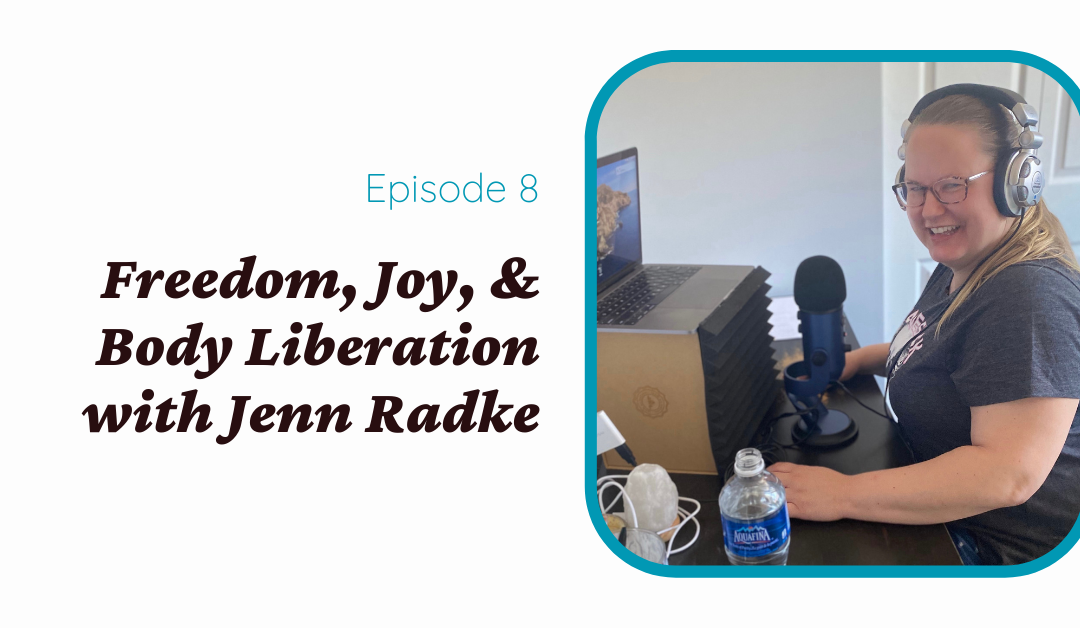Podcast: Play in new window | Download
Subscribe to Motivation Made Easy! Apple Podcasts | Google Podcasts | Spotify | RSS | More
Episode 8. Today’s episode is a conversation with Jenn Radke and it’s a great one.
Jennifer Radke is a certified body image coach, podcast host and fat activist. Her story includes decades on a diet cycle, two bodybuilding shows and a diagnosed eating disorder. In her coaching practice, her focus is on giving chronic dieters practical tips to being able to improve the relationship they have with their bodies and get off the diet rollercoaster. Her podcast, Fat Girl Book Club talks to people doing cool things in body acceptance spaces about a body acceptance book. You can find her under her business name, I Wish I Were Me on Facebook and Instagram.
Jenn’s Body Liberation Journey
She shares her journey of extreme weight loss cycling for 20 years and arguably having a diet-type mentality dating back to age 5 or 6. She ended this 3 years ago and started on her body liberation journey. I didn’t know her back then but she is a happy, healthy, vibrant human doing work she loves. Important work in the body acceptance space.
She reflects with us on the 2 decades of intense dieting, 18 formal diets (including Weight Watchers, Jenny Craig, and many more), 2 body building shows and an eating disorder diagnosis.
What Motivates Change? Emotions, not Information.
She talks about what made her eventually stop. Jenn and I reflected on the fact that although she loves books, research and information, that alone was not enough to get her to change. She had to have what she calls a “rock bottom moment” where her weight loss coach questioned her commitment to her “self-care” when she took two weeks to care for her uncle who was in hospice.
She had read Health at Every Size by Dr. Lindo Bacon, but it was that moment that really made the difference for her.
Deconstructing and Redefining “Health”
I can decide what does the value of health mean for me.
Jenn Radke
Jenn gives us the insider’s view of what it was like to try to reframe and reconstruct what health meant to her.
She talked about practical things she did like writing down all the things she gave to dieting, including all of the mental, emotional, and cognitive energy it took from her for years. She reflects on this if she is tempted to diet again.
Only the Person in the Body Knows
We discussed how most of the time, with the exception of more extreme behaviors, typically only the person in the body knows if their behavior is healthy or not.
The judgment of this can go both ways. Someone can look at someone who is exercising 4 times per week and say “oh that’s really healthy” or even in the other extreme, Jenn talks about how occasionally in the body acceptance space people can assume this means someone is still in the “diet mentality.”
We clarify that the true definition of autonomy is someone that’s known by the person in the body alone and how the exact same behavior can be autonomous or controlled (by the diet mentality or “shoulds”) and it’s important not to judge a book by it’s cover (in many, many ways).
Practical Ways to Improve Your Body Image
Jenn gives us some really practical strategies for improving body image. These include:
- Reflecting on your dieting triggers. Being aware of what these are (e.g., might be seeing a picture of yourself, or noticing you gained weight) can help you be prepared and know you have choices when you get that urge. Weight loss dieting isn’t the only option.
- Curating your social media. Become aware of the messages you consume. Avoid following folks who make you feel bad about yourself.
- Buying comfortable clothes.
Take Home Message: It’s Great Over Here!
Jenn exudes vibrancy and energy. Again, I didn’t know her when she was dieting, but based on her story I venture a guess that she’s bringing so much more of her authentic self to the world now that she isn’t focused on rigid calorie counting and plan following and achieving a certain body in the name of “health.”
She glows when she talks about pursuing her dreams and goals and helping others do the same.
I’m grateful for her message and sharing her story with us today!
Disclosure: This page includes affiliate links meaning that I get a commission if you decide to make a purchase through my links, at no cost to you. I have not received any money to promote or review these products.
Disclaimer: This blog and podcast is for informational and educational purposes only. It is not a substitute for individual professional advice or treatment, including medical or mental health advice. It does not constitute a provider patient relationship.
